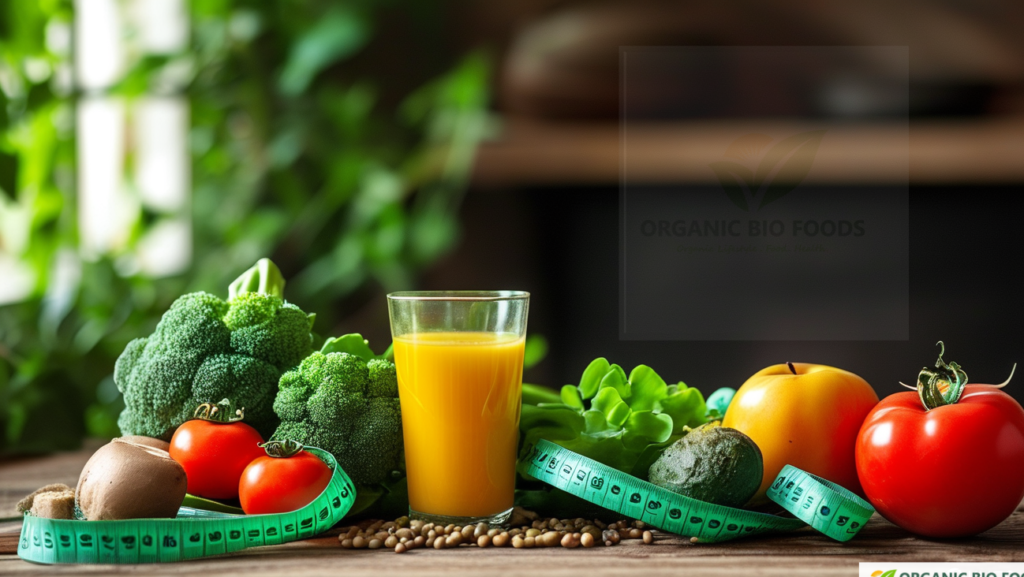In a world where the trends in diets keep changing, the benefits of organic foods don’t seem to budge. It’s not breaking news that organic food makes a huge difference in your weight loss routine. Besides being much healthier than non-organic food, it will help you achieve that body shape you desire by losing weight effectively. Below are ten ways eating organic food can support losing weight.
1. Less Pesticides, Less toxin
Conventional farming methods often include the use of synthetic pesticides and chemicals. All these accumulate in your body to create endocrine disruptions, producing hormonal imbalances, and will hinder weight loss. Organic foods are grown without synthetic pesticides, so you’re less likely to have intakes of these harmful substances in your body. A cleaner body is going to function more efficiently, making it easier to burn fat and lose weight.
2. More Nutrient-Dense
Organic produce—fruits, vegetables, and grains—are more dense in levels of bioavailable nutrients: vitamins, minerals, and antioxidants. These nutrients are the keys to metabolism and energy production and health in general. If your body is getting what it needs, it will hum along at its best level, thereby fostering weight loss by suppressing appetite and increasing energy.
3. Greater Satiation and Appetite Control
Organic foods tend to be filling because they have no artificial additives or preservatives that can become an interference course to clear hunger signals. Eating organic therefore means that the body recognizes the food better, thus processing it better, and it will keep you satisfied longer. This increased satiety means you’re much less likely to snack between meals or overeat, leading to natural weight loss.
4. Fewer Empty Calories
Processed foods are full of empty calories—those that provide no or little nutritional value. Blood sugar–spiking foods will leave you feeling hungry, craving more. Organic foods are minimally processed and so contain more natural nutrients. By cutting down on the empty calories and increasing your intake of nutrient-dense organic food, you’re more likely to remain within your calorie limits while feeling full.
5. Supports Gut Health
You can’t keep your weight under control when you have an unhealthy gut. Organic food, particularly organically grown produce, is often richer in fiber—a key factor in the maintenance of gut flora. Balanced gut flora means one will digest well, the body will be free from inflammation, and metabolic health will be maintained—three major driving forces of weight loss. What’s more, organic foods are less likely to be contaminated by antibiotics or growth hormones both of which are sworn enemies of gut bacteria and promoters of weight gain.
6. Reduces Inflammation
Any kind of inflammation in the body causes weight gain. Moreover, it makes it really hard to lose weight. So many of the foods available today include elements added into them that will make your body inflamed. Since organic foods do not have those bad substances, they help your body have less inflammation. The less inflammation there is, the more your body will be able to focus on burning fat and allowing you to lose weight.
7, Promotes Lean Muscle Mass
This can help in ordering everything in the metabolism towards health and hence towards successful weight loss. Organic meats and dairy products do not contain any added hormones or antibiotics that are given to animals to hasten their growth. Consequently, it becomes a cleaner source of protein for muscle growth and repair. More muscle mass implies a higher resting metabolic rate, hence enabling the body to burn more calories even while at complete rest.
8. Maintains Balance of Hormones
Hormones are known to play a significant role in weight management. Many conventional foods contain artificial hormones and hormone-disrupting chemicals that knock out of balance the natural levels of hormones within your body. When this happens, you gain weight, usually in the midsection. By eating organically grown foods, you are reducing your intake of these toxins, which in turn will help to keep the hormones in check and really aid in weight loss.
9. Promotes Mindful Eating:
Organic foods are pricier, and hence, people tend to eat more thoughtfully. When you are spending money on high-end, organically grown produce, meats, and grains, you are more likely to appreciate your meal and not overeat or leave food on your plate. This mindful attitude spills over into portion control and really being attuned to your hunger and fullness. From being more mindful of what and how you eat, you’re less likely to overeat; hence, it becomes easier to maintain weight.
10. Less Added Sugar
Most conventionally processed food items are chock-full of added sugars, a primary cause of weight accumulation and resultant obesity. Most organic foods have lesser added sugar content, especially whole foods such as fruits, vegetables, and grains. With intake of lesser amounts of added sugar and also the greater amounts of the natural sweetness found in organic produce, it finally levels out the blood sugar levels; individual cravings go down and also results in an increase in weight loss.
Conclusion
Adding some organic foods to your diet will naturally help in weight loss. Rich, clean, and healthy food intake provides an environment in the body that helps sustain support for fat burning, reduces inflammation, and maintains good health. While this organic food might prove to be a bit more expensive, what you gain in terms of health and weight loss outweighs any extra cost. Next time you are at the grocery store, go organic and take that one step closer to your weight loss goal.








